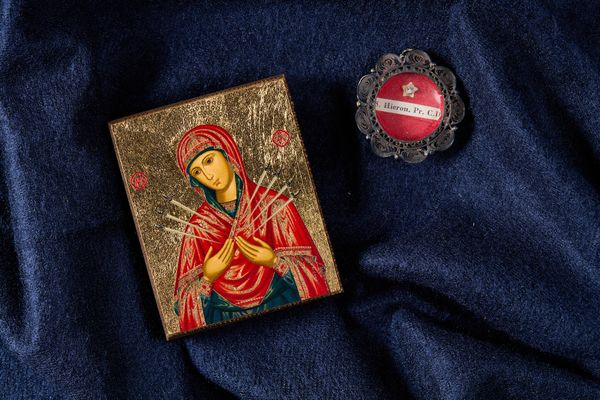Jerome, also known as Jerome of Stridon, was an early Christian priest, confessor, theologian, and historian; he is commonly known as Saint Jerome. He is best known for his translation of the Bible into Latin known as the Vulgate and his commentaries on the whole Bible. Jerome attempted to create a translation of the Old Testament based on a Hebrew version, rather than the Septuagint, as prior Latin Bible translations used. His list of writings is extensive. In addition to his biblical works he wrote polemical and historical essays, always from a theologian's perspective.
Jerome was known for his teachings on Christian moral life, especially to those living in cosmopolitan centers such as Rome. In many cases, he focused his attention on the lives of women and identified how a woman devoted to Jesus should live her life. This focus stemmed from his close patron relationships with several prominent female ascetics who were members of affluent senatorial families.
Early life
Jerome was not baptized until about 360–369 in Rome, where he had gone with his friend Bonosus of Sardica to pursue rhetorical and philosophical studies. There he learned Latin and at least some Greek. As a student, Jerome engaged in the superficial escapades and sexual experimentation of students in Rome; he indulged himself quite casually but he suffered terrible guilt afterwards. To appease his conscience, on Sundays he visited the sepulchers of the martyrs and the Apostles in the catacombs. This experience reminded him of the terrors of Hell:
Often I would find myself entering those crypts, deep dug in the earth, with their walls on either side lined with the bodies of the dead, where everything was so dark that almost it seemed as though the Psalmist's words were fulfilled, Let them go down quick into Hell. Here and there the light, not entering in through windows, but filtering down from above through shafts, relieved the horror of the darkness. But again, as soon as you found yourself cautiously moving forward, the black night closed around and there came to my mind the line of Virgil, "Horror ubique animos, simul ipsa silentia terrent".
Conversion
Jerome went for a time to the desert of Chalcis, to the southeast of Antioch. During this period, he seems to have found time for studying and writing. He made his first attempt to learn Hebrew under the guidance of a converted Jew; and he seems to have been in correspondence with Jewish Christians in Antioch. Around this time he had copied for him a Hebrew Gospel, of which fragments are preserved in his notes. It is known today as the Gospel of the Hebrews which the Nazarenes considered to be the true Gospel of Matthew. Jerome translated parts of this Hebrew Gospel into Greek.
Mission In Rome
In Rome, Jerome was surrounded by a circle of well-born and well-educated women, including some from the noblest patrician families. The resulting inclination of these women towards the monastic life, away from the indulgent lasciviousness in Rome, and his unsparing criticism of the secular clergy of Rome, brought a growing hostility against him among the Roman clergy and their supporters. Jerome was forced to leave his position at Rome after an inquiry was brought up by the Roman clergy into allegations that he had an improper relationship with the widow Paula. Still, his writings were highly regarded by women who were attempting to maintain vows of becoming consecrated virgins. His letters were widely read and distributed throughout the Christian empire and it is clear through his writing that he knew these virgin women were not his only audience.
Translattion Of The Bible
Jerome was a scholar at a time when that statement implied a fluency in Greek. He knew some Hebrew when he started his translation project, but moved to Jerusalem to strengthen his grip on Jewish scripture commentary. He settled next to the Church of the Nativity – built half a century prior on orders of Emperor Constantine over what was reputed to be the site of the Nativity of Jesus – and he completed his translation there. He began in 382 by correcting the existing Latin-language version of the New Testament, commonly referred to as the Vetus Latina. By 390 he turned to translating the Hebrew Bible from the original Hebrew, having previously translated portions from the Septuagint which came from Alexandria. He believed that the mainstream Rabbinical Judaism had rejected the Septuagint as invalid Jewish scriptural texts because of what were ascertained as mistranslations along with its Hellenistic heretical elements. He completed this work by 405. Prior to Jerome's Vulgate, all Latin translations of the Old Testament were based on the Septuagint, not the Hebrew. Jerome's decision to use a Hebrew text instead of the previous-translated Septuagint went against the advice of most other Christians, including Augustine, who thought the Septuagint inspired.
Credits:
Discriptions of saints lives and biographies have been excerpted, summarized, or compiled from
Franciscan Media,
CatholicSaints.Info,
Catholic Online, and
Wikipedia.

